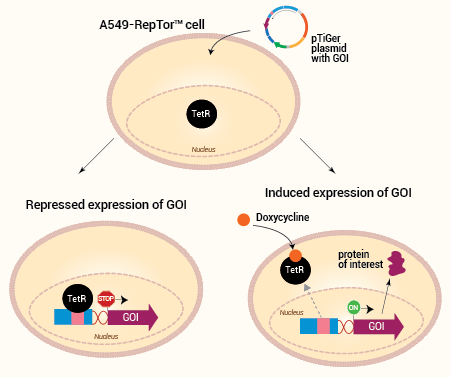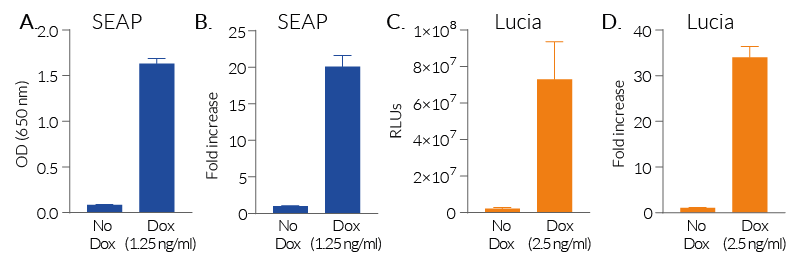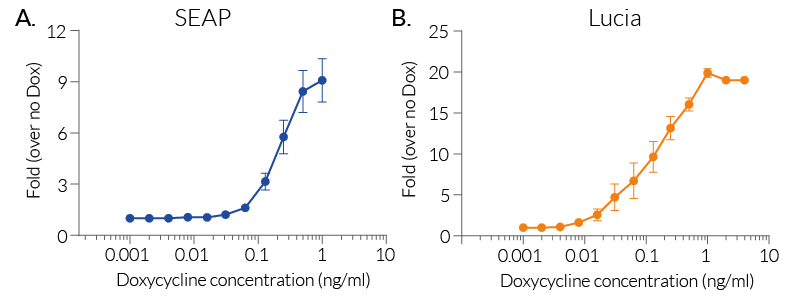A549 Cells for Tet-Inducible Gene Expression
| Product | Unit size | Cat. code | Docs. | Qty. | Price | |
|---|---|---|---|---|---|---|
|
A549-RepTor™ Cells TetR-expressing A549 cells |
Show product |
3-7 x 10e6 cells |
a549-rtor
|
|
||
|
A549-RepTor™ vial Additional cell vial |
Show product |
3-7 x 10e6 cells |
a549-rtor-av
|
Notification: Reference #a549-rtor-av can only be ordered together with reference #a549-rtor.
Tetracycline repressor-expressing A549 cell line

Inducible gene expression in A549-RepTor™ cells
A549-RepTor™ cells are derived from the human lung carcinoma A549 cell line, a widely used cellular model. These cells were specifically engineered for InvivoGen's TiGer tet-on system.
They are designed for the tetracycline-inducible expression of a gene of interest (GOI), including cytotoxic proteins.
Description
A549-RepTor™ cells stably and constitutively express an optimized tetracycline repressor (TetR) construct [1]. They are readily transfectable with a pTiGer plasmid, carrying a gene of interest (GOI), cloned downstream of the tet-inducible CMV-EF1-TRE promoter. GOI expression is induced upon addition of doxycycline, a synthetic analog of the tetracycline antibiotic, leading to the derepression of the CMV-EF1-TRE promoter. Low doxycycline concentration, ranging from 1 to 10 ng/ml, is sufficient for full induction, thus limiting the antibiotic side effects [2].
Key features
- Strong and stable TetR expression for minimal GOI leakiness
- Readily transfectable with a pTiGer-mcs or pTiGer-reporter plasmid
-
Strong GOI expression with a low doxycycline dose
Applications
pTiGer-transfected RepTor™ cells are useful for, but not restricted to the following applications:
- Controlled expression of cytotoxic genes
- Fine-tuned expression of a GOI
- Screening of toxic protein inhibitors
RepTor™ cells are functionally validated by transient transfection with a pTiGer-reporter plasmid expressing either SEAP or Lucia luciferase. These cells are resistant to Blasticidin. They are also extensively tested for viability, stability, and absence of mycoplasma to ensure strong and reproducible results.
For your convenience, RepTor™ cells are shipped with 1 mg of doxycycline and 10 mg of blasticidin.
![]() Learn more about InvivoGen's pTiGer Tet-on system.
Learn more about InvivoGen's pTiGer Tet-on system.
References:
1. Hillen, W., Wissmann, A. (1989). Tet repressor-tet operator interaction. Protein-Nucleic Acid Interaction. DOI: 10.1007/978-1-349-09871-2_7.
2. Luger, AL., et al., (2018). Doxycycline Impairs Mitochondrial Function and Protects Human Glioma Cells from Hypoxia-Induced Cell Death: Implications of Using Tet-Inducible Systems. Int J Mol Sci, 19(5):1504.
Specifications
Antibiotic resistance: Blasticidin
Growth medium: DMEM, 4.5 g/l glucose, 2 mM L-glutamine, 10% (v/v) fetal bovine serum, 100 U/ml penicillin, 100 μg/ml streptomycin, 100 μg/ml Normocin™
Quality Control:
- Inducible reporter activity in the presence of doxycycline has been validated using A549-RepTor™ cells transfected with pTiGer2-SEAP.
- The stability for 20 passages, following thawing, has been verified.
- These cells are guaranteed mycoplasma-free.
Contents
- 1 vial containing 3-7 x 106 cells
- 1 ml Blasticidin (10 mg/ml)
- 1 ml Normocin™ (50 mg/ml)
- 1 mg Doxycycline
![]() Shipped on dry ice (Europe, USA, Canada, and some areas in Asia)
Shipped on dry ice (Europe, USA, Canada, and some areas in Asia)








